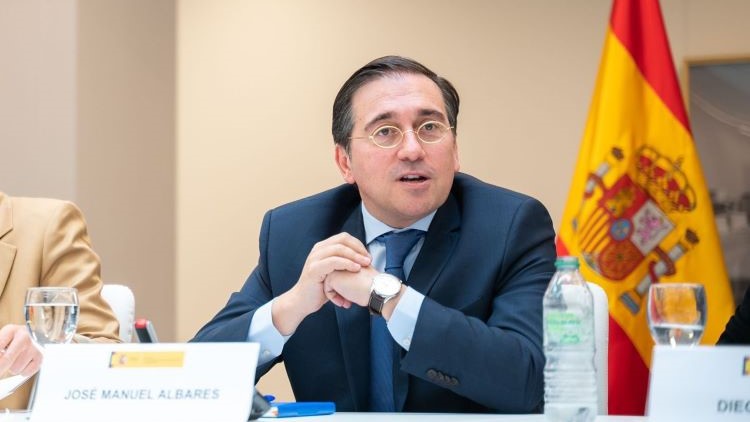Eduardo González
Yesterday, the Government tried to convey a message of normality and tranquility to the EU institutions and Member States about the possible effects of the early general elections on the development of the Spanish Presidency of the Council of the Union. The six-month period, which will begin three weeks before the elections, will inevitably be conditioned by the results of the votes, the investiture negotiations and the limitations of the incumbent government, which will have to steer the ship for at least half of the Presidency.
On the one hand, the Minister of Foreign Affairs, José Manuel Albares, received yesterday at the headquarters of his Department in Madrid the Secretary General of the Council of the European Union, the French Thérèse Blanchet, who has held the post since last November 1st for a period of five years. Foreign Ministry sources told The Diplomat yesterday that it was a routine meeting that had already been scheduled before the elections were brought forward and did not give details on the content of the conversation.
On the other hand, Albares participated yesterday in the first session of the Reflection Group for the Spanish Presidency of the EU, which brings together some twenty experts in European affairs to listen to their ideas and proposals for the preparation of the semester. “The Spanish EU Presidency is a project of the whole country. The ideas and the voice of civil society are also present,” the minister declared via Twitter.
Likewise, the Minister of Agriculture, Luis Planas, was yesterday the first member of Pedro Sánchez’s government to participate in an EU meeting since the announcement of the early elections. In statements in Brussels upon his arrival at the Council of Ministers of Agriculture and Fisheries of the European Union, Planas assured, in an attempt to reassure European partners, that the elections will not affect the Spanish Presidency.
“Spain is a country that is used to and experienced in assuming institutional responsibilities at national and European level,” he told the press. “To those who want, in some way, to see it negatively, we reassure them, because we are going to ensure our institutional and political responsibilities as Presidency of the European Union,” he added.
Planas also recalled that during the recent French Presidency (first half of 2022) elections were also held, in this case presidential, so “the taboo was broken some time ago” that elections should not be held during a Council Presidency. Indeed, France went to the polls in April 2022, in the middle of the EU Council Presidency. Emmanuel Macron won re-election in the second round after beating Marine Le Pen of the National Front with 58.5% of the votes.
The calendar
In any case, it seems unlikely that the early elections will not affect the Spanish semester. During the announcement of the anticipation of the elections, the President of the Government, Pedro Sánchez, not only reminded this past Monday that Spain “is about to carry out a very important responsibility in this geopolitical context that Europe is living and that is the Presidency of the Council of the European Union”, but he even added that this is one of the reasons that “advise a clarification of the will of the Spanish people, a clarification of the policies that the Government of the nation must apply and a clarification of the political forces that must lead this phase”.
The votes will be held just three weeks after Spain assumes, for the fifth time, the Presidency of the Council of the European Union, which will begin on July 1 and will end on December 31. The Constitution does not establish specific deadlines between the holding of a general election and the investiture of the new government. Normally, the parties usually take a month to reach an agreement on who should be the president of the Congress.
There is also no established time frame for the duration of the investiture negotiations and the Constitution limits itself to a maximum period of two months between the first investiture vote and the formation of the new Government. Therefore, everything points to the fact that both the investiture negotiations and the formation of the new government will most probably condition the first three months of the Presidency, during which the host country will be in the hands of an acting government.
The Spanish semester will take place in the last stretch of the European institutional cycle, before the elections to the European Parliament scheduled for May 2024 and the subsequent appointment of a new Commission. It will also include numerous high-level events in a large number of Spanish cities, including informal ministerial meetings (including the Foreign Affairs and Defense Council, which will take place in Toledo at the end of August), meetings of Permanent Representatives to the Union (COREPER), meetings of the European Political Community (the Heads of State and Government of the 27 EU countries plus countries such as the United Kingdom, Ukraine and Turkey) and of the European Council, Ukraine or Turkey) and the Informal European Council of Heads of State or Government of the 27 EU countries (both in Granada at the beginning of October), the EU-CELAC Summit (which will take place in mid-July -in the middle of the election campaign- in Brussels, although within the framework of the Spanish Presidency) or the EU-Western Balkans ministerial meeting in Valencia.






